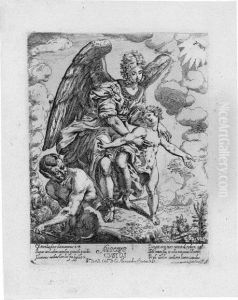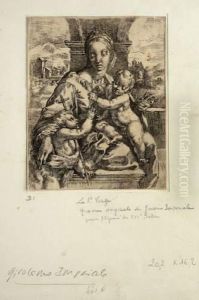Girolamo Imperiale Paintings
Girolamo Imperiale was an Italian poet and librettist, born in 1590 in Genoa, Italy. Although his contributions to the art world are often overshadowed by the towering figures of the Italian Renaissance and Baroque periods, Imperiale carved out a unique space for himself within the cultural milieu of the early 17th century. His work primarily revolved around the crafting of libretti for operas, a form of entertainment that was burgeoning at the time, alongside his poetic endeavors which were well-regarded by his contemporaries.
Imperiale's early life was marked by an immersion in the vibrant cultural and intellectual life of Genoa, which was then one of the major maritime republics. This environment provided a fertile ground for his literary and artistic inclinations. He was educated in the classical tradition, which deeply influenced his literary output. Imperiale's career took a significant turn when he became involved in the early opera scene, contributing texts that were set to music by composers of the era. His libretti are noted for their poetic quality, intricate narratives, and the way they seamlessly integrated with the music, enhancing the dramatic effect of the operas.
Throughout his career, Imperiale was involved with several of the most prominent composers and musicians of his time, collaborating on works that were performed in Genoa and other Italian cities. His works contributed to the evolution of opera from its early experimental stages to a more structured and popular form of entertainment. Despite the popularity of his works during his lifetime, many of his contributions to opera and poetry have not survived or have been overshadowed by the works of more renowned contemporaries.
Girolamo Imperiale died in 1648 in Genoa. His legacy is that of a cultural figure who played a significant role in the development of Italian opera and poetry in the early 17th century. While not as widely recognized today as some of his peers, Imperiale's work remains an important part of the study of the period's artistic and literary developments. His contributions reflect the broader cultural movements of his time, including the burgeoning interest in opera as a form of dramatic and musical expression and the continued relevance of classical themes and forms in literary production.

